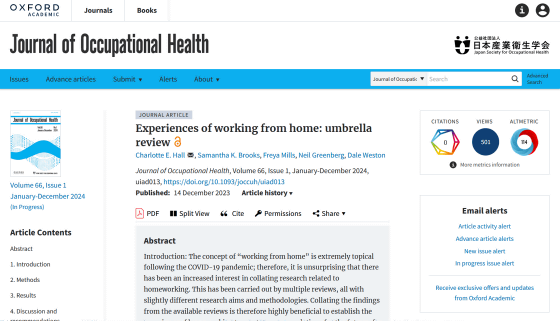Employees who work from home eat healthier and experience less stress, but they also experience issues such as weight gain and career concerns.

Remote work has been promoted around the world in the wake of the new coronavirus infection (COVID-19) pandemic, but as vaccinations become widespread and the epidemic subsides, various companies are transitioning from remote work to office work. I am returning. A British study reviewed various academic papers on remote work and analyzed the benefits and drawbacks remote work brings to employee health and productivity.
Experiences of working from home: umbrella review | Journal of Occupational Health | Oxford Academic

Working from home can bring big health benefits, study finds | Working from home | The Guardian
https://www.theguardian.com/business/2024/feb/17/working-from-home-can-bring-big-health-benefits-study-finds
As more people work remotely due to the pandemic, various studies are being conducted on the advantages and disadvantages of remote work. A research team from the UK Health Security Agency (UKHSA) and King's College London analyzed a total of six studies that conducted systematic reviews on remote working, and analyzed the following: ``Work environment,'' ``Personal impact,'' and ``Health.'' We have summarized the results regarding the theme.
◆Work environment
One study showed that 70% of remote workers work from their living room or bedroom rather than a dedicated workspace, making use of small spaces that don't disturb other family members. . Many employees did not receive ``special training for remote workers,'' and the proportion of those who had received training related to working from home was even smaller.
On the other hand, remote workers were more likely to work long hours without taking breaks and to work on weekends and nights. It has also been reported that the increased autonomy and flexibility afforded by remote work has led to more positive feelings among employees.

◆Personal influence
Although many employers remain concerned that remote work will lead to lack of supervisory oversight and employee laziness, studies reviewed by the researchers found that remote work generally improves productivity. The results have been shown. However, while improving productivity on creative tasks, it may have a negative impact on productivity on boring tasks, and if you have commitments outside of work, such as raising children, productivity may deteriorate. There are also studies that suggest this.
Another major concern for employees working remotely is isolation due to reduced social and professional interaction, as well as uncertainty about their career futures. When working remotely, employees lose commitment to the workplace and their contributions become less visible, causing employees to worry that remote work will have a negative impact on their career. It seems that there is. In fact, some studies have shown that women who work remotely are more likely to be suspected by others of not working, and that remote workers experience less salary growth.

◆Health
The shift to remote work is associated with increased intake of vegetables, fruits, dairy products, snacks, and self-cooked meals, and young workers and women in particular are likely to eat healthier meals. He said he received great benefits. On the other hand, the consumption of unhealthy foods such as alcohol and tobacco has also increased due to remote work, with research showing that 46.9% of remote workers said they had gained weight. did.
Additionally, it has been reported that employees who work remotely spend significantly less time on physical activity and spend more time sedentary compared to employees who are in the office.
When it comes to employee mental health, some studies have shown that remote work is associated with less stress among employees, while others have found that they have lower blood pressure and are more relaxed than those working in an office.

Co-author Neil Greenberg, a psychiatrist at King's College London, said companies should no longer consider whether they should work remotely, but how to make remote work work. He claims to have reached a stage. “What we need to do is not ask, ‘Is remote working beneficial for someone?’ The answer is clearly yes.” We need to find ways to help.”
Related Posts:
in Science, Posted by log1h_ik







